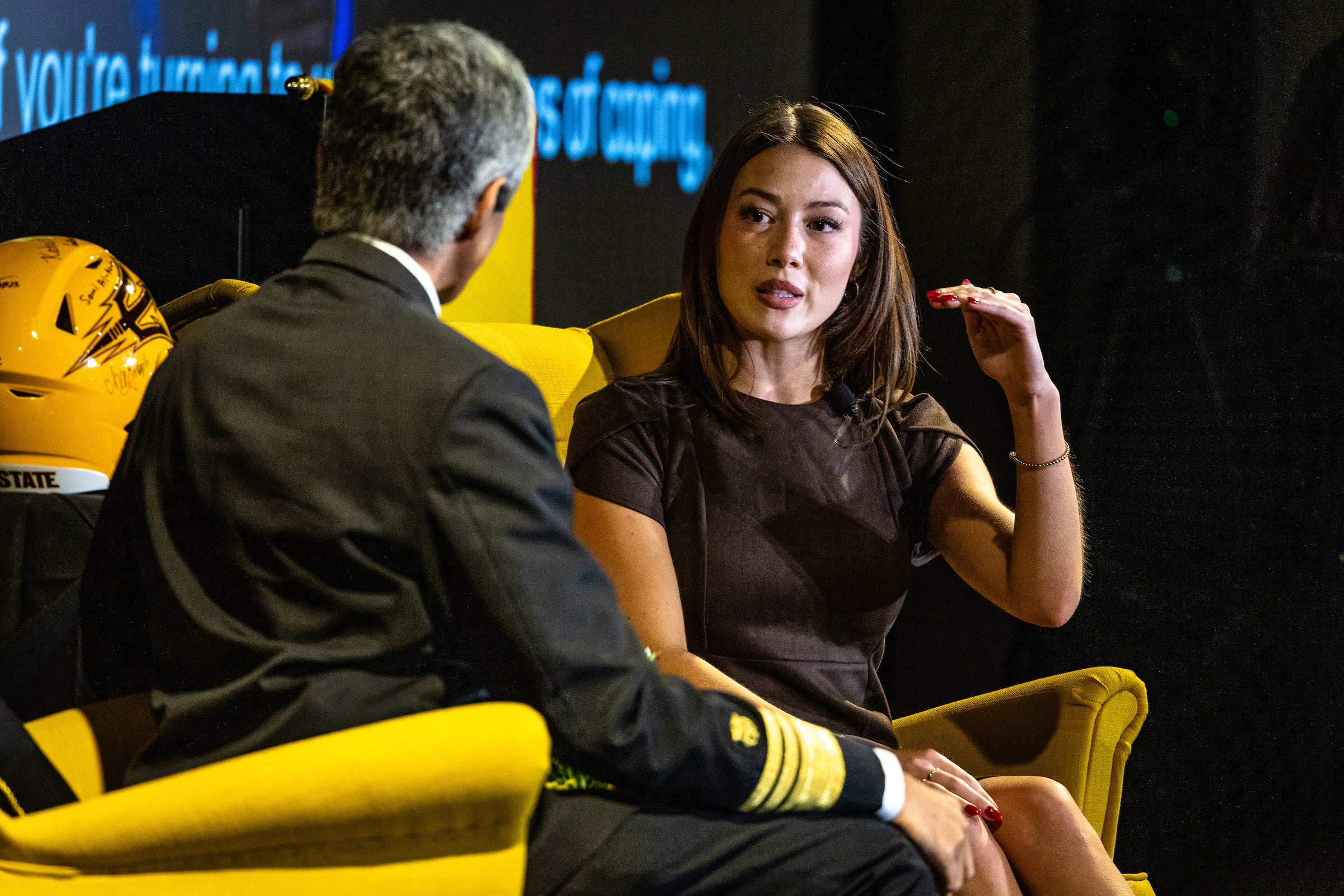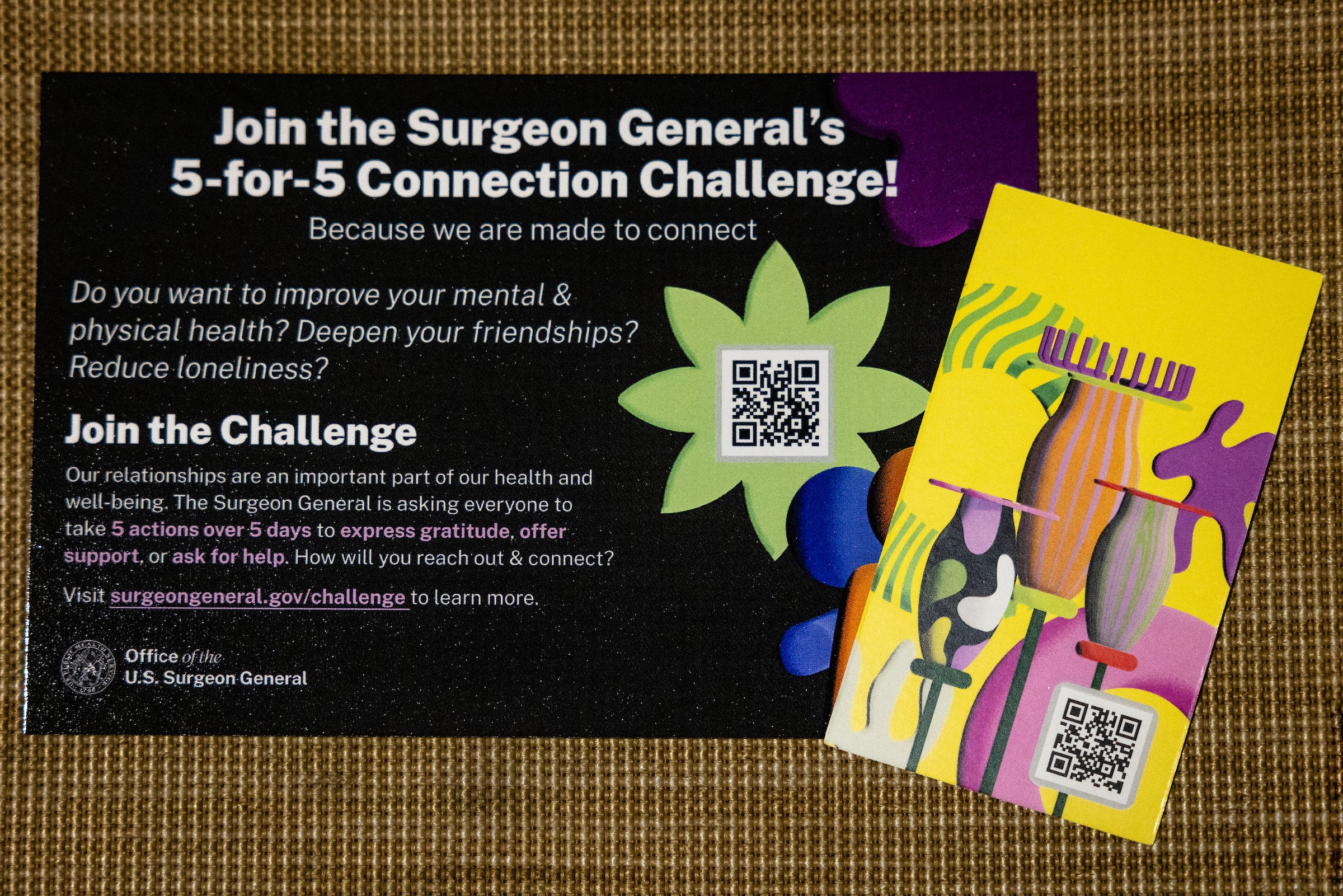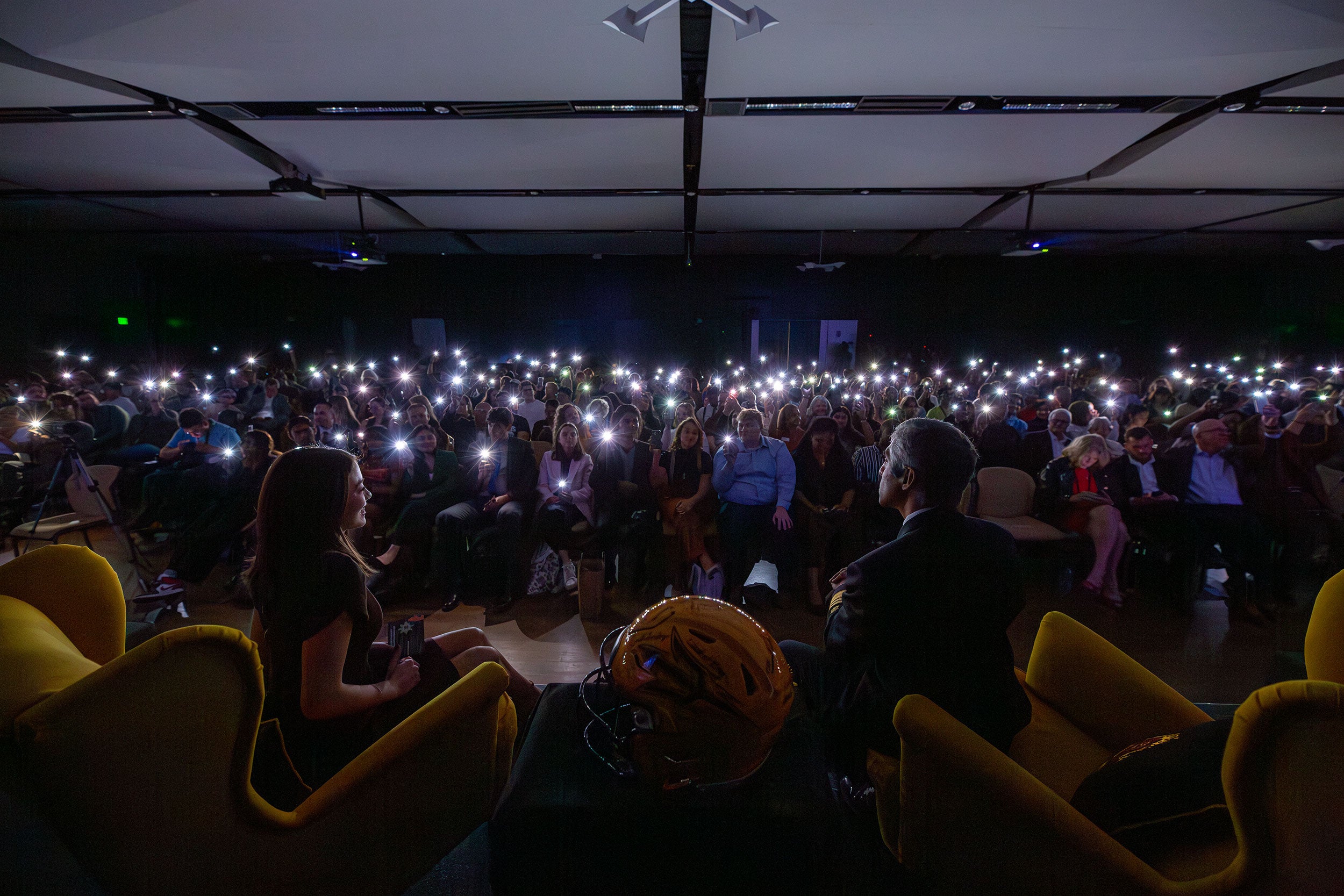Amid loneliness epidemic, surgeon general asks students to focus on connections

U.S. Surgeon General Vivek Murthy speaks during the ASU stop of his “We Are Made to Connect” tour, held Monday, Nov. 13, at the Memorial Union on the Tempe campus. Photo by Charlie Leight/ASU News
Editor’s note: This story is featured in the 2023 year in review.
Loneliness is a dangerous, nationwide epidemic, according to the country’s top doctor, who told a crowd of students at Arizona State University that they must try to create a culture of connectedness to heal.
“We can all do something about it,” said U.S. Surgeon General Vivek Murthy during his talk at the Memorial Union on the Tempe campus Monday.
“We can do simple things like reaching out and checking on one another. The power of a simple check-in on a friend — texting a friend to say, ‘Hey, I'm just thinking about you to see how you're doing.’ ...
“Or swinging by somebody who might be eating by themselves in the dining hall.”
Those actions are small but powerful, he said.
“What you do when you check in on someone is ... you’re telling them, ‘I see you. You have value. You’re not invisible.’
“And that’s important in a world where so many people are feeling invisible.”
Murthy visited ASU as part of his nationwide “We Are Made to Connect" tour to colleges this fall to talk about loneliness. The ASU visit was his only stop at an Arizona university.
He was at ASU in May as the commencement speaker, where he told the new graduates that it’s important to nourish their relationships. During his term, he has released Surgeon General Advisories on the youth mental health crisis, social media’s impact on youth mental health and the epidemic of loneliness and isolation.
“Loneliness has real consequences for our health,” he told the ASU crowd on Monday, citing increases in the risk for depression, anxiety, physical illness, dementia and suicide.
“The overall mortality rate of social disconnectedness is on par with smoking daily,” he said.
Murthy’s talk was a Q&A format with ASU student Emma Broyles, a biomedical sciences major in Barrett, The Honors College, who served as Miss America 2022. She has frequently talked about her struggles with mental health.
Ways to connect
Counseling support is available to ASU students 24 hours a day, seven days a week, at no cost at eoss.asu.edu/counseling.
To find a student club, organization or activity, students should check out Sun Devil Sync at asu.campuslabs.com/engage.
Students who have questions on connecting should email deanofstudents@asu.edu.
Broyles said she has dealt with diagnoses of ADHD, obsessive-compulsive disorder and anxiety, and she had a tough time after her term as Miss America ended in December 2022. She took two weeks away from school during the spring semester.
“I experienced a very difficult period of anxiety and depression, to the point where I was experiencing very significant suicide ideation. So I had to go home to Alaska to be with my family while I started my antidepressants,” she said.
When she returned, Broyles was reluctant to describe to her friends and co-workers why she took time away, but decided to be open about her period of self-care.
“I was shocked to find that many of them also have been diagnosed with anxiety and depression, and a couple of them take the same antidepressant I do” she said.
“Those types of conversations and connections you build with your peers can make you feel you’re not alone and not feel like an outsider.”
Broyles said she believes transparency about her mental health will help her in her career as a medical professional.
“I remember when I first became Miss America, feeling that people wouldn’t take me seriously because I was so open about my mental health struggles and people would see me as less than I was,” she said.
“But I was so fortunate to hear from so many that they experienced similar things and how much it meant to see public figures using their platform to speak about their experiences.
“Being able to see yourself in somebody else makes you feel not alone.”
Emma Broyles, a fourth-year ASU biomedical sciences and honors student, who was named Miss America in 2022, speaks with U.S. Surgeon General Vivek Murthy during the ASU stop of his “We Are Made to Connect” tour held Nov. 13 at the Memorial Union on the Tempe campus. Photo by Charlie Leight/ASU News
Murthy also shared the times in his life he struggled with his mental health. As a child, he was ashamed of his isolation and loneliness and would pretend to be sick to avoid going to school.
“I felt it was my fault,” he said. “I didn’t want to walk into the cafeteria one more time and feel there was no one to sit with me.”
Murthy said he let his personal relationships falter during his first term as surgeon general, under President Barack Obama. And when it was over, in 2017, he was isolated and lonely. So when President-elect Joe Biden asked him to serve again, in 2020, Murthy’s wife asked him, “What’s going to be different this time?”
“I had to learn from my mistakes,” he said. “I had to build a people-centered life.”
Murthy said that reversing the epidemic of loneliness will require a cultural shift.
“What we’re trying to build is a peopled-centered life, where people are the priority. When a friend is in crisis, we show up. When a family member needs something, we’re there.
“But what we have and what society pushes us toward is a work-centered life. Not that work isn’t important. But it turns out that when we are more connected to each other, we’re better at work.”
Murthy said he has heard from hundreds of college students that they’re lonely, even when surrounded by hundreds of peers on a big campus. But he sees those same students as driving the change in attitudes about mental health.
“It’s this young generation of high school students and college students and recent graduates who have the courage to think differently and talk differently,” he said.
“There’s still a stigma that surrounds mental health problems. But the good news is that more help is available. There’s more help on campus, and now we have the 988 crisis hotline where you can call or text and be connected to a trained mental health counselor,” he said, noting that millions of people have used the 988 line since it launched in 2022.
Murthy said that one way to boost social connection is to put down your phone. This not only helps increase attention while interacting with others, it decreases the time spent on social media.
“If you spend just 10 minutes talking to somebody and put everything else away, and give the benefit of your full attention and look into their eyes and listen and respond to what they’re saying, it can feel extraordinarily powerful,” he said.
He said that students should consider taking occasional breaks from social media.
“Social media can dilute the quality of interactions and make you feel like you’re comparing yourself to others online,” he said.
Murthy’s tour of college campuses includes the “5-for-5 Connection Challenge,” in which students are asked to do five acts of connection, such as expressing gratitude or asking for help, over five days.
Students were given cards that encouraged them to participate in the 5-for-5 Connection Challenge during the Arizona stop of the “We Are Made to Connect" tour, held at ASU on Nov. 13. Photo by Charlie Leight/ASU News
In the Memorial Union on Monday, he told the crowd: “Think about someone you’re grateful for in your life.”
He then asked them to take an immediate action.
“Write a text or email to the person — it can be a single line — and tell them why you’re thinking of them or grateful. Then turn on your phone flashlight on and hold it up,” he said.
Within moments, the ballroom glowed with hundreds of lights.
“Each of these lights represent a ray of hope, a ray of connection, that went out into the universe,” he said.
“I want you to lead lives of fulfillment and deep joy. That can only happen if we focus on the relationships in our lives.”
Audience members display the lights on their phones after sending a text to someone, as prompted by U.S. Surgeon General Vivek Murthy during his “We Are Made to Connect” tour, held Nov. 13 at ASU's Tempe campus. Photo by Armand Saavedra/Academic Enterprise
More Health and medicine

'Incredible milestone': ASU, city of Phoenix announce location for ASU Health headquarters
Citing the need for a “new way” of doing things, Arizona State University President Michael Crow said that the headquarters for ASU Health will be the hub of the university’s efforts to improve…

Have a health question? This newsletter is for you
You sprain a knee while playing basketball. Your stomach hurts all the time. You keep getting bad headaches.What’s the first thing you do, besides making a doctor’s appointment?If you’re like most…

Spring clean your social life
Spring: a season of growth, warmer weather and perhaps a case of the sniffles. But as much as the flowers are budding and blooming, so should — hopefully — our social connections. Or are they…


